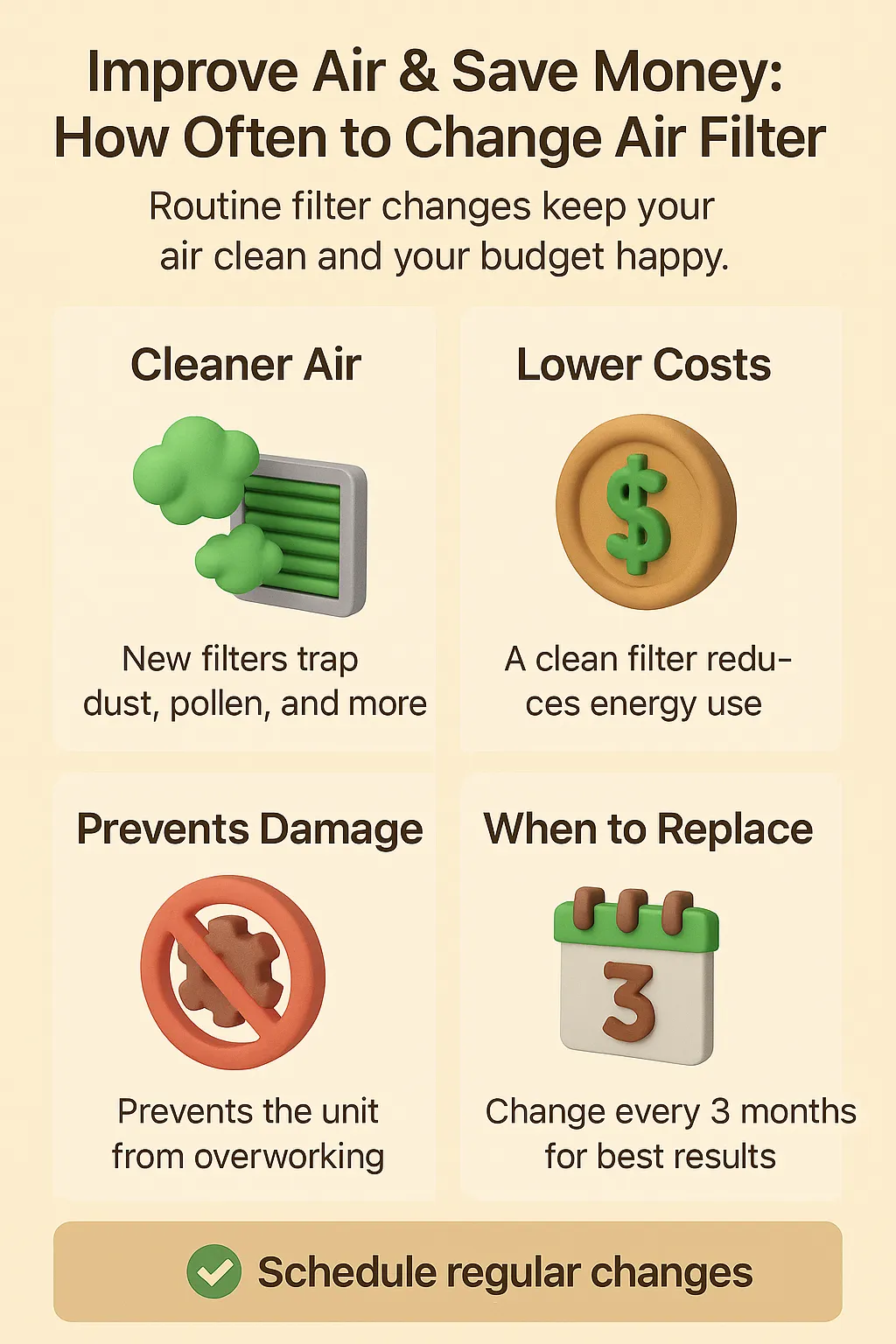In this guide, you'll discover how often to change your air filter based on your household’s needs, the financial and health benefits of proactive maintenance, and why this small habit delivers a big return.
Key Takeaways
Improve air quality and reduce allergens
Prevent HVAC breakdowns and costly repairs
Save 5–15% on annual energy bills
Extend the life of your heating and cooling system
Reduce dust buildup in your home
Why Filter Timing Makes All the Difference
Letting a filter sit past its recommended lifespan clogs your system with dust, pet dander, and pollutants. This causes your HVAC unit to work harder, which increases energy usage, reduces airflow, and recirculates allergens throughout your space.
Recommended Replacement Timeline:
Homes with pets or allergies: every 30–45 days
Homes with no pets or allergies: every 90 days
Vacation properties or light-use homes: every 6–12 months
These guidelines are based on real service calls, not just packaging claims.
Firsthand Perspective from the Field
“After inspecting thousands of HVAC units, the trend is clear—delayed filter changes lead to higher energy use and more emergency repairs. Clean filters not only cut costs but improve how people feel in their own homes.”
Real-Life Examples: The Cost of Ignoring Filter Changes
The $900 Mistake
A Florida family with two dogs skipped their filter changes for over six months. When summer hit, their HVAC failed. The cause? A burnt-out blower motor from restricted airflow. The repair cost nearly $1,000—far more than a box of fresh filters.
The $20 Fix for Better Breathing
A renter in Los Angeles suffered from constant coughing and congestion. Switching to a MERV 11 filter and replacing it every 45 days cleared her symptoms in just two weeks. The $20 filter improved sleep and comfort overnight.
What Our Technicians See Across Hundreds of Homes
Pet owners and smokers: Filters clog fast—change every 30 days
Allergy sufferers: Every 30–45 days for clean, breathable air
Low-traffic households: Can wait 6–12 months
One-size-fits-all timelines don’t work—your lifestyle dictates your filter schedule
Data That Supports the Savings
Dirty filters can increase HVAC energy use by up to 20%
(Source: U.S. Department of Energy)Clean filters reduce A/C energy use by 5–15%
(Source: energy.gov)Most air pollutants originate indoors—trapped and circulated by dirty filters
(Source: EPA.gov)CDC recommends frequent filter changes in schools to minimize airborne illness
(Source: cdc.gov)
Final Thoughts
Small habits create lasting savings. Replacing your HVAC filter regularly is a low-effort, high-reward way to improve your indoor air and reduce your monthly bills. We've seen it time and time again: homeowners who stay on schedule enjoy fewer issues, healthier air, and lower energy use.
Don’t wait until a problem forces you to act. Make filter changes part of your routine, and you’ll notice the difference—in both comfort and cost.
Take Action Now
Inspect your current filter—if it’s dusty or dark, replace it.
Set a recurring reminder on your phone or calendar.
Use this schedule:
Pets/allergies: every 30–45 days
No pets: every 90 days
Low-use systems: every 6–12 months
Buy filters in multipacks to save time and money.
Track your changes with a simple home checklist.

Frequently Asked Questions
How often should I change my air filter to save money
Every 30–90 days depending on your household. More frequent changes = better efficiency and lower bills.
Does changing the filter really help with allergies
Yes. Clean filters trap dust, pollen, and dander—reducing allergy triggers indoors.
What happens if I forget to replace it
Airflow becomes restricted, energy use rises, and system components can fail prematurely.
Are expensive filters always better
Not necessarily. Look for filters with a MERV rating of 8 that balance filtration and airflow.
Can this really lower my energy bill
Yes. According to energy.gov, clean filters can reduce A/C energy use by up to 15% annually.
Understanding how often to change your air filter is a key step in reducing household energy bills and breathing cleaner air, especially for families looking to boost HVAC performance affordably. Routine upkeep, like scheduling air duct cleaning in Hurlburt Field, Florida, complements regular filter changes and helps remove dust buildup that restricts airflow. Additionally, ensuring your system is sealed correctly—such as through duct sealing in Coral Springs, FL—prevents energy loss and enhances indoor comfort. Just like a well-timed air filter replacement maximizes your HVAC's effectiveness, the benefits of hiring a motivational speaker demonstrate how expert insights can empower action. Whether you're deciding which motivational speaker can inspire your next event or which HVAC move delivers the most impact, the right choices start with clear guidance—and this article delivers exactly that.







